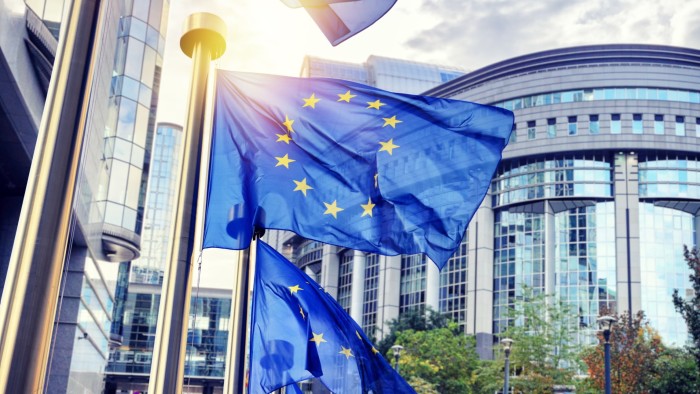Unlock the Editor’s Digest for free
Roula Khalaf, Editor of the FT, selects her favourite stories in this weekly newsletter.
The swagger of EU competition officials had only grown over the past four decades. A once lowly Brussels department — known as DG IV — steadily expanded its ambition and supranational powers to become the world’s most feared antitrust enforcer.
But that march of muscular market liberalism, which enraged corporate titans from GE’s Jack Welch to Apple’s Tim Cook, has now stalled. Across Europe, the political tide is shifting, leaving the European Commission’s antitrust warriors facing a defining period of reform — and soon, a critical change of leadership.
Fierce policy battles lie ahead. Before them comes a pivotal appointment: choosing a successor to Olivier Guersent, DG Competition’s top civil servant, whose no-nonsense reputation echoes throughout Brussels.
It is perilous to underestimate the clout of the commission’s permanent bureaucracy. These committed technocrats are the embodiment of the EU’s institutional power, and often read Europe’s politics as well as a fleeting European commissioner, who may spend just a term or two in Brussels.
Among the technocrats, those leading the competition section have particular sway, and were dubbed the “ayatollahs” for good reason. They guarded and enforced the provisions of the EU treaties that gave the commission exceptional powers to strike down mergers, crack down on cartels and declare government subsidies illegal.
Guersent’s boss, the commissioner for competition Teresa Ribera — a Spanish politician relatively new to antitrust and more focused on the green elements of her brief — has been instructed to overhaul merger control and industrial policy but has yet to clearly say how.
That uncertainty makes the choice of Guersent’s successor especially significant — offering the first clear sign of how far the commission might open the door to bigger-is-better mergers within the single market.
“Ribera has a big job and is new to this field,” said one former senior competition official. “DG Competition is a very big machine and makes a lot of decision itself.”
At stake is nothing less than the commission’s regulatory DNA: its consumer-first principles in merger decisions and deep institutional scepticism towards governments attempting to engineer corporate “European champions”.
For years, France in particular has bridled at some of DG Competition’s decisions, seeing them as the result of an “Anglo-Saxon” approach to free markets. Other commission officials and political appointees have also vented at the almost theological insistence of the “ayatollahs” on sticking to the rules.
The field of contenders to replace Guersent casts further light on these ideological splits that could shape competition policy’s future.

Anthony Whelan, long considered a frontrunner, is an Irish official steeped in tech policy, who advised commission president Ursula von der Leyen on digital and competition issues. His proximity to von der Leyen suggests a willingness to use competition policy as a lever for industrial strategy, helping European companies scale up against US and Chinese rivals.
Another potential candidate is Ditte Juul Jørgensen, current head of the energy directorate, who could align neatly with Ribera’s green agenda. Jørgensen’s antitrust pedigree includes a stint as head of cabinet for the former competition chief Margrethe Vestager, but she lacks deep roots in DG Comp.
Competition purists favour Céline Gauer, a French official who cut her teeth prosecuting major antitrust cases, including against Gazprom.
Gauer’s nomination would allow Paris to hold on to a key job in Brussels. But she is no vassal for Paris — during her years in Brussels, Gauer earned a reputation for relishing taking on groups from her home state.

Should no decision be made by the time Guersent retreats to his vegetable garden in France, the top job will temporarily pass to one of his deputies, Linsey McCallum.
Ahead of his retirement at the end of this month, colleagues presented Guersent with a life-sized cardboard cut-out of himself — a wry tribute to his larger-than-life reputation in Brussels.
Competition traditionalists, meanwhile, will be praying the department itself does not become a cardboard cut-out of its former power.
